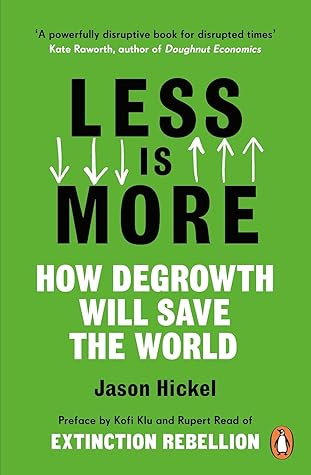More on this book
Community
Kindle Notes & Highlights
by
Jason Hickel
Read between
August 23 - August 28, 2021
countries with higher GDP per capita will have higher ecological impact, and vice versa.
What brings a nation’s birth rate down? Investing in child health, so that parents can be confident their children will survive; investing in women’s health and reproductive rights, so that women have greater control over their own bodies and family size; and investing in girls’ education to expand their choices and opportunities.
GDP might continue growing even as social and ecological systems begin to collapse.
We need to reorganise the economy so that it operates within planetary boundaries, to maintain the Earth’s life-supporting systems which we depend on for our existence.32
tell, the only feasible way to do it would be to actively slow down industrial production. Reducing the scale of global energy use would make it easier to accomplish a quick transition to renewables.
Growth is like the third rail: touch it and you die. Growth must go on.
more growth means more energy demand, and more energy demand makes it all the more difficult (and probably impossible) to generate enough renewable capacity to meet it in the short time we have left.
If we want to succeed, we have to do exactly the opposite: we have to scale down energy use.
it could end up tearing holes in the ozone layer, slow photosynthesis to the point of decreasing crop yields, and irreversibly alter global rainfall patterns and weather systems – mostly to the detriment of the global South.
our economic system demands that we grow production and consumption at an exponential rate.
Just because it hasn’t been done before doesn’t mean it’s not possible.
When we innovate more efficient ways to use energy and resources, total consumption may briefly drop, but it quickly rebounds to an even higher rate.
what if this assumption is wrong? What if high-income countries don’t need growth? What if we can improve human well-being without having to expand the economy at all?
more GDP isn’t necessary for improving human welfare at all.
The more you learn, the longer you live.
more egalitarian societies turn out to have lower levels of per capita emissions,
Rich people have a much higher ecological footprint than everybody else. The richest 10% of the world’s population are responsible for more than half of the world’s total carbon emissions since 1990.
Instead of pursuing growth for its own sake and hoping that it will magically improve people’s lives, the goal must be to focus on improving people’s lives first
Justice is the antidote to growth.
living in a more equitable society, on the one hand, and risking ecological catastrophe on the other.
capitalism externalises social and ecological costs.
degrowth is not about reducing GDP. It is about reducing the material and energy throughput of the economy to bring it back into balance with the living world, while distributing income and resources more fairly,
Advertisements did little more than inform customers of the useful qualities of a product.
capitalism has a tendency to be anti-democratic, and democracy has a tendency to be anti-capitalist.
forest, it takes an average of only sixty-six years for a forest to recover 90% of its old-growth biomass, completely naturally. All you have to do is leave it alone.
Colonialism as such may have ended half a century ago, but – as we’ve seen – those old patterns of plunder continue to this day, with ruinous consequences.
It requires decolonising not only lands and forests and peoples, but decolonising our minds.
we need new sources of hope, new wellsprings of possibility – new visions for how things could be otherwise.
Living beings, nature and humans alike, had to be rendered as objects so they could be legitimately exploited.
any process of decolonisation must therefore begin with a process of de-thingification.
The more we learn, the stranger (or perhaps more familiar?) it all becomes.
spending time around trees makes people more co-operative, kinder and more generous. It increases our sense of awe and wonder at the world, which in turn changes how we interact with others.
Capitalism ultimately relies on a single, overarching principle: take more than you give back.
ecological crisis that seems to be opening us to new ways of thinking (or rather beckoning us to older ways of thinking) about our relationship with the more-than-human world.
There is nothing more powerful than a question.


